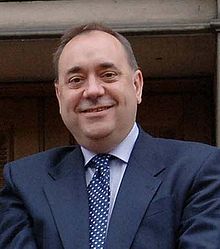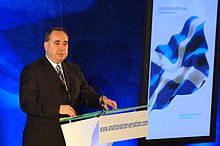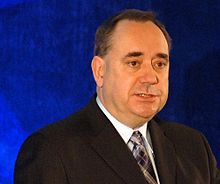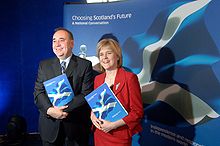- Alex Salmond
-
The Right Honourable
Alex Salmond
MSPFirst Minister of Scotland Incumbent Assumed office
16 May 2007Deputy Nicola Sturgeon Preceded by Jack McConnell Leader of the Scottish National Party Incumbent Assumed office
3 September 2004Preceded by John Swinney In office
22 September 1990 – 26 September 2000Preceded by Gordon Wilson Succeeded by John Swinney Member of the Scottish Parliament
for Aberdeenshire East
Gordon (2007–2011)Incumbent Assumed office
3 May 2007Preceded by Nora Radcliffe Majority 15,295 (50.5%) Member of the Scottish Parliament
for Banff and BuchanIn office
6 May 1999 – 7 June 2001Preceded by Constituency Created Succeeded by Stewart Stevenson Member of Parliament
for Banff and BuchanIn office
11 June 1987 – 6 May 2010Preceded by Albert McQuarrie Succeeded by Eilidh Whiteford Personal details Born 31 December 1954
Linlithgow, ScotlandPolitical party Scottish National Party Spouse(s) Moira Salmond Residence Bute House (Official)
Strichen (Private)Alma mater University of St Andrews Profession Economist Religion Church of Scotland[1] Website Scottish National Party Alexander Elliot Anderson "Alex" Salmond MSP (
 /ˈsæmənd/) (born 1954) is a Scottish politician and current First Minister of Scotland. He became Scotland's fourth First Minister in May 2007. He is the Leader of the Scottish National Party (SNP), having served as Member of the Scottish Parliament (MSP) for Gordon. From 1987 to 2010 he served as Member of Parliament for Banff and Buchan in the UK House of Commons. Salmond previously held the position of leader of the SNP from September 1990 until he stepped down in September 2000.
/ˈsæmənd/) (born 1954) is a Scottish politician and current First Minister of Scotland. He became Scotland's fourth First Minister in May 2007. He is the Leader of the Scottish National Party (SNP), having served as Member of the Scottish Parliament (MSP) for Gordon. From 1987 to 2010 he served as Member of Parliament for Banff and Buchan in the UK House of Commons. Salmond previously held the position of leader of the SNP from September 1990 until he stepped down in September 2000.Originally from Linlithgow, West Lothian, Salmond is a graduate of the University of St Andrews, where he achieved a Joint Honours MA in Economics and History. After earning his degree he began his career in the Government Economic Service (GES), and later joined the Royal Bank of Scotland as an energy economist where he wrote and broadcast extensively for both domestic and international media outlets.
Following the establishment of the devolved Scottish Parliament in 1999, he was elected MSP for Banff and Buchan, thus simultaneously representing the area as both Member of Parliament (MP) and MSP. Salmond resigned as SNP leader in 2000 and did not seek re-election to the Scottish Parliament. He did however retain his Westminster seat in the 2001 general election. Salmond was once again elected SNP leader in 2004 and the following year held his Banff and Buchan seat in the 2005 general election. In 2006 he announced his intention to contest the Gordon constituency in the 2007 Scottish Parliament election, an election in which Salmond defeated the incumbent MSP and in which nationally, the SNP emerged as the largest single party. Salmond was voted First Minister by the Scottish Parliament on 16 May 2007.
As First Minister, from 2007 to 2011 Salmond headed a minority Scottish Government, but after the 2011 Scottish Parliament election the Scottish National Party, which he leads, emerged with an overall majority. Politically, Salmond is one of the foremost proponents of Scottish independence, repeatedly calling for a referendum on the issue. Salmond has campaigned on global warming and in government has committed Scotland to legislation on emission reduction and the generation of renewable energy. Other recurring campaign themes include nuclear disarmament and Salmond's strong opposition to the 2003 invasion of Iraq.
Early life and career
Salmond was born in Linlithgow, in West Lothian, Scotland on 31 December, (Hogmanay) 1954. He is the second of four children born to Robert Fyfe Findlay Salmond and Mary Stewart Salmond (née Milne), both of whom were civil servants.[2] Salmond attended the local Linlithgow Academy before studying at the University of St Andrews, where he lived in St Salvator's Hall and graduated with a Joint Honours MA in Economics and History.[3]
In 1978 he entered the Government Economic Service as an Assistant Economist in the Department of Agriculture and Fisheries for Scotland, part of the now defunct Scottish Office. Two years later he joined the Royal Bank of Scotland where he worked for seven years: first as an Assistant Economist before being appointed Oil Economist in 1982, and from 1984 combining that role with duties as a bank economist.[3] While with the Royal Bank, he wrote and broadcast extensively for both domestic and international outlets. He also contributed regularly to oil and energy conferences. In 1983 Salmond created a "Royal Bank/BBC oil index" that is still used.
Personal life
Salmond's main interests outside work and politics are golf, horse racing, football and reading.[4] He supports Scotland and Heart of Midlothian F.C. and sometimes attends matches. He also attended the 2008 UEFA Cup Final between Rangers FC and Zenit St Petersburg.
He takes an interest in Scottish cultural life, as well as watching Star Trek and listening to country and western music.[5] For Children in Need in 2008, Salmond performed an impersonation of the Rikki Fulton character, the Reverend I M Jolly.
He has also been a visiting Professor of Economics at Strathclyde University. He and his wife Moira live in Strichen in Aberdeenshire.
Early political career
Salmond became active in the SNP when he joined the Federation of Student Nationalists at the University of St Andrews in 1973. Although a left-winger at the time he joined, he had considerable doubts as to whether or not the Labour Government would legislate for a devolved Scottish Assembly.
Salmond started his political life as a committed left-winger inside the SNP and was a leading member of the socialist republican organisation within it, the 79 Group. He was, along with other group leaders, suspended from membership of the SNP when the 79 Group was banned within the larger party. In 1981, he married Moira French McGlashan,[6] then a senior civil servant with the Scottish Office.
Following the SNP's National Council narrowly voting to uphold the expulsion, Salmond and the others were allowed back into the party a month later, and in 1985 he was elected as the SNP's Vice Convener for Publicity.
In 1987 he stood for Parliament in Banff and Buchan and defeated the incumbent Conservative MP, Albert McQuarrie. Later that year Salmond became Senior Vice Convener (Deputy Leader) of the SNP. He was at this time still viewed as being firmly on the left of the party and had become a key ally of Jim Sillars, who joined him in the British House of Commons when he won a by-election for the seat of Glasgow Govan in 1988. Salmond served as a member of the House of Commons Energy Select Committee from 1987 to 1992.
First time as SNP leader
When Gordon Wilson stood down as SNP leader in 1990, Salmond decided to contest the leadership. His only opponent was Margaret Ewing, whom Sillars decided to support. This caused considerable consternation amongst the SNP left as the two main left leaders were opposing each other in the contest. Salmond went on to win the leadership election by 486 votes to Ewing's 146.[7]
His first test as leader was the general election in 1992, with the SNP having high hopes of making an electoral breakthrough. Whilst considerably increased its share of the vote, it failed to win a large number of seats. Sillars lost his, causing him to describe the Scottish people as '90 minute patriots'. This comment ended the political friendship between Salmond and Sillars, and Sillars would soon become a vocal critic of Salmond's style of leadership.
The SNP increased its number of MPs from four to six in the 1997 general election, which saw a landslide victory for the Labour Party. After election, Labour legislated for a devolved Scottish parliament in Edinburgh.
Although still committed to a fully independent Scotland, Salmond signed the SNP up to supporting the campaign for devolution, and, along with Scottish Labour leader Donald Dewar and Scottish Liberal Democrat leader Jim Wallace, played an active part in securing the victory for devolution in the Scotland referendum of 1997. However, many hard line fundamentalists in the SNP objected to committing the party to devolution, as it was short of full political Scottish independence.
Salmond's first spell as leader was characterised by a moderation of his earlier left-wing views and by his firmly placing the SNP into a gradualist, but still pro-independence, strategy.
Salmond was one of the few politicians in the UK to oppose the NATO bombing of Serbia in 1999.[8] He was opposed to the conflict because it was not authorised by a United Nations Security Council resolution, which was a controversial subject at the time. Despite this, Salmond was heavily criticised in the media for describing Tony Blair's decision to intervene militarily as an "unpardonable folly".[9]
Several years as party leader earned Salmond an unusually high profile for an SNP politician in the London-based media. In 1998, Salmond won the Spectator Award for Political strategist of the Year. Following an appearance on the entertainment programme Call My Bluff, Salmond used one of the 'bluff' cards that are used as props in the show in the run-up to the first elections to the Scottish Parliament. To counter his frustration at having to sit in silence through what he claimed was an inappropriately political speech by Tony Blair at a charity lunch, he held up the bluff card as the Prime Minister began querying Scotland's economic prospects should independence occur.[10] Throughout his time in politics, Salmond has maintained his interest in horse racing, writing a weekly column for The Scotsman and appearing a number of times on Channel 4's The Morning Line.
Resignation and time in Westminster
Salmond was elected to the Scottish Parliament in 1999 and was one of its highest profile members. He stood down as SNP leader in 2000, and was replaced by his preferred successor John Swinney, who defeated Alex Neil for the post. He left the Scottish Parliament in 2001 to lead the SNP group in the House of Commons.
2003 Invasion of Iraq
During the prolonged parliamentary debates in the run-up to the 2003 invasion of Iraq he voiced strong opposition to the UK's participation. In the aftermath of the war, he lent support to the attempt of Adam Price, a Plaid Cymru MP, to impeach Tony Blair over the Iraq issue. Salmond has gone further than many anti-war politicians in claiming that Blair's statements on the presence of weapons of mass destruction in Iraq were consciously intended to deceive the public.[11] He has also claimed that Blair had made a pact with George W. Bush "to go to war come what may".[11]
Return as leader
On 15 July 2004, Alex Salmond said that he would be a candidate in the forthcoming election for the leadership of the SNP.[12] This came as a surprise because Salmond had previously declared that he would definitely not be a leadership candidate.[12] In the postal ballot of all members he went on to receive over 75% of the votes cast, placing him well ahead of his nearest rival Roseanna Cunningham.[13] Although he was re-elected in the 2005 general election, he made clear his intention to return to the Scottish Parliament at the 2007 Scottish parliamentary election in an attempt to win power for the first time.[13]
In that election, Salmond stood as a candidate for the Gordon constituency, which had been represented since 1999 by the Liberal Democrat Nora Radcliffe.[14] Salmond won the seat with 41% of the vote, and a majority of 2,062, returning to the Scottish Parliament after six years' absence. In the election the SNP emerged as the largest party, winning 47 seats to Labour's 46.
First Minister
Having won more seats than any other party in the 2007 Scottish Parliament election, the SNP initially approached the Scottish Liberal Democrats to form a coalition, but they declined to take part in negotiations.[15] This left the SNP without any possibility to form a coalition with an overall majority. The Scottish Green Party agreed to support an SNP minority administration on a confidence and supply basis.[16]
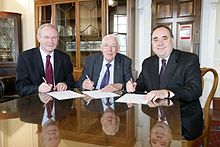 Salmond (right) meets Ian Paisley (centre) and Martin McGuinness (left) at Edinburgh Castle in February 2008.
Salmond (right) meets Ian Paisley (centre) and Martin McGuinness (left) at Edinburgh Castle in February 2008.
Salmond was elected by the Scottish Parliament as First Minister on 16 May 2007, and was sworn in on 17 May after receiving the Royal Warrant from the Queen and taking the official oath of allegiance before judges at the Court of Session.[17] Under section 45(7) of the Scotland Act 1998 he became Keeper of the Great Seal of Scotland at the same time.[18] Salmond is the first nationalist politician to hold the office of First Minister.[19] He reduced the size of the Cabinet from nine members to six, and said he would seek to govern on a "policy by policy" basis.[19] In order to concentrate on his new role as First Minister, Salmond stood down as the SNP group leader at Westminster and was replaced by Angus Robertson.[20]
The Guardian reported in November 2007 that Salmond believed Scotland would be independent within "the next decade".[21]
In November 2007, Salmond received the The Spectator's Parliamentarian of the Year Award for his "brilliant campaign" and "extraordinary victory" in the Scottish Parliament elections, thereby ending eight years of Labour rule.[22]
2010 TV election debate
Salmond said it would be "unacceptable"[23] for the SNP to be excluded from the 2010 UK election televised debate and has sought "guarantees of inclusion from the broadcasters, given their inescapable duty to ensure fairness and impartiality in election-related coverage in Scotland" in the build up to the 2010 UK general election. The party used the Freedom of Information Act to see if the BBC could have broken its own rules. Salmond said it was entirely unacceptable to Scotland as well as to the SNP for the broadcasters to exclude the party that forms the Scottish Government and leading in Westminster election polls. He emphasised, however, that he was not trying to stop any debates from being broadcast.[24] After having failed to change the BBC's decision to not include the SNP in the final British debate, in line with the decision by ITV and Sky News, the SNP mounted a legal challenge to the BBC at the Court of Session in Edinburgh. Despite earlier reassurances by the SNP that it was not trying to stop the broadcast, it sought an 'interim interdict' to prevent the debate being broadcast without the participation of the SNP. However, the Court of Session dismissed the SNP's complaint, and refused to ban the BBC from broadcasting the third debate in Scotland, on the grounds that the SNP had left the bringing of the case "far too late", had not contested the broadcasting of the first two debates by ITV and Sky Television, and that the third debate would in any case be broadcast by Sky on satellite across Britain, which a Scottish court had no power to block. The judge, Lady Smith, further ordered the SNP to pay the BBC's legal expenses. The SNP's political opponents described the SNP's contesting of the case as a "stunt".[25]
There were Scottish debates dealing with specifically devolved issues which Salmond had accepted the invitation to attend along the other parties within the Scottish Parliament on Sky TV. Salmond declined to attend those held on the BBC and ITV, and Angus Robertson agreed to take his place in these debates.[26]
Renewable energy
Alex Salmond in his 2010 New Year message highlighted the importance of sustainable development and renewable energy in Scotland and the required increase in powers of the Scottish Parliament needed to help harness Scotland's green energy potential and therefore take full advantage of the "renewable revolution".[27]
Earlier in December 2009, he campaigned for climate change legislation at the UN Climate Change Conference in Copenhagen to promote Scotland's role in tackling and mitigating climate change. This included signing a Partnership Agreement with the Maldives, one of the most exposed countries to the consequences of rising sea levels.[28][29]
See also
- Referendum (Scotland) Bill, 2010
Further reading
Biographies
- David Torrance, Salmond: Against The Odds, Birlinn, 2010
Other
- Goring, Rosemary (2007). Scotland, the autobiography: 2,000 years of Scottish history by those who saw it happen. Viking. pp. 432–4. ISBN 978-0-670-91657-3.
- Lynch, Peter (2002). SNP: the history of the Scottish National Party. Welsh Academic Press. ISBN 978-1-86057-003-2.
References
- ^ Allardyce, Jason (26 July 2009). "Salmond: 'Faith is my driving force'". London: Sunday Times Scotland. http://www.timesonline.co.uk/tol/news/uk/scotland/article6727842.ece. Retrieved 26 July 2009.
- ^ "Alex Salmond: The new king of Scotland". London: The Independent. 10 August 2008. http://www.independent.co.uk/news/people/profiles/alex-salmond-the-new-king-of-scotland-889764.html. Retrieved 7 April 2010.
- ^ a b Alex Salmond MSP, Scottish National Party, Retrieved 7 April 2010.
- ^ "Take away politics and golf, and horse-racing would be my favourite pastime", The Independent, 5 January 1997
- ^ In conversation with... Alex Salmond[dead link], Total Politics
- ^ Moira Salmond: A reluctant First Wife, The Telegraph, 11 May 2007
- ^ Deacon, Russell; Sandry, Alan (2007). Devolution in the United Kingdom. Edinburgh University Press. p. 94. ISBN 978-0-7486-2416-4. http://books.google.com/books?id=WF6A5yF6GukC&pg=PA94&dq=Alex+Salmond&hl=en&cd=1#v=onepage&q=Alex%20Salmond&f=false.
- ^ SNP News Release 30/03/99 12:06[dead link]
- ^ Nato bombing 'unpardonable folly', BBC News, 29 March 1999.
- ^ Salmond calls Blair's bluff, BBC News, 1 May 1999.
- ^ a b Salmond back with threat to impeach PM, The Independent, 25 September 2004.
- ^ a b Salmon launches leadership bid, BBC News, 15 July 2004.
- ^ a b Salmond named as new SNP leader, BBC News, 3 September 2004.
- ^ Salmon to contest Holyrood seat, BBC News, 16 January 2006.
- ^ Lib Dems rule out SNP coalition, BBC News, 7 May 2007
- ^ Scottish Green Party website
- ^ MSPs approve new Scottish cabinet, BBC News, 17 May 2007.
- ^ Scotland Act 1998, section 45(7)
- ^ a b Salmond elected as first minister, BBC News, 16 May 2007.
- ^ Robertson elected SNP's Westminster leader, The Guardian, 23 May 2007.
- ^ Severin Carrell (17). "Scotland in 2017 - independent and flush with oil, says Salmond". London: Guardian News and Media Limited. http://www.guardian.co.uk/politics/2007/nov/14/scotland.devolution1. Retrieved 2010-07-30. "Ale x [sic] Salmond has predicted that Scotland will win independence from the UK within the next decade ... "It would be much easier if we had the full powers of an independent country," he said. "Therefore I was anticipating being in that position by 2017.""
- ^ Salmond 'is top parliamentarian'
- ^ Salmond in SNP debate inclusion call
- ^ "Legal threats to election debate". BBC News. 22 December 2009. http://news.bbc.co.uk/1/hi/8425990.stm. Retrieved 23 April 2010.
- ^ 'Too late' Alex Salmond loses battle with the BBC over debate
- ^ Salmond happy with Sky TV debate
- ^ Scotland's top politicians outline aims for 2010
- ^ We can help climate fight: Salmond[dead link] (Press Association)
- ^ Alex Salmond: Our small country can play a big role in climate change fight
External links
- Rt Hon Alex Salmond MSP (alexsalmond.org)
- Member of the Scottish Parliament (MSP) (Scottish.parliament.uk)
- First Minister (Scotland.gov.uk)
- Official biography (www.snp.org)
- Guardian profile, Electoral history and profile (guardian.co.uk)
- TheyWorkForYou.com
- Voting Record — Alex Salmond MP, Banff & Buchan (10525) (The Public Whip)
Offices held
First Ministers of Scotland Donald Dewar · Henry McLeish · Jack McConnell · Alex Salmond
Alex Salmond (First Minister) · Nicola Sturgeon (Deputy First Minister and Health, Wellbeing and Cities Strategy) · John Swinney (Finance, Employment and Sustainable Growth) ·
Michael Russell (Education and Lifelong Learning) · Bruce Crawford (Parliamentary Business and Government Strategy) · Kenny MacAskill (Justice) ·
Richard Lochhead (Rural Affairs and the Environment) · Fiona Hyslop (Culture and External Affairs) · Alex Neil (Infrastructure and Capital Investment)Heads of governments of the United Kingdom Her Majesty's Government
(Central)Northern Ireland Executive
(Devolved)ConsociationalistScottish Government
(Devolved)Alex SalmondWelsh Government
(Devolved)LabourLeaders of political parties in the United Kingdom House of Commons David Cameron (Conservatives) · Ed Miliband (Labour) · Nick Clegg (Liberal Democrats) · Nigel Dodds (DUP) · Angus Robertson (SNP) · Gerry Adams (Sinn Féin) · Elfyn Llwyd (Plaid Cymru) · Alasdair McDonnell (SDLP) · Caroline Lucas (Green) · David Ford (Alliance)
Scottish Parliament Alex Salmond (SNP) · Iain Gray (Labour) · Ruth Davidson (Conservatives) · Willie Rennie (Liberal Democrats) · Patrick Harvie and Eleanor Scott (Green)
National Assembly for Wales Carwyn Jones (Labour) · Andrew R. T. Davies (Conservatives) · Ieuan Wyn Jones (Plaid Cymru) · Kirsty Williams (Liberal Democrats)
Northern Ireland Assembly Peter Robinson (DUP) · Gerry Adams (Sinn Féin) · Tom Elliott (UUP) · Alasdair McDonnell (SDLP) · David Ford (Alliance) · Jim Allister (TUV) · Steven Agnew (Green)
Minor parties Nick Griffin (BNP) · George Hargreaves (Christian) · Robin Tilbrook (English Democrats) · Rob Wheway (Liberal) · Dick Cole (Mebyon Kernow) · Billy Hutchinson (Progressive Unionist Party) · Salma Yaqoob (Respect) · Colin Fox and Frances Curran (SSP) · Arthur Scargill (Socialist Labour) · Tommy Sheridan and Rosemary Byrne (Solidarity) · Nigel Farage (UKIP)
Portal:Politics - List of political parties - Politics of the United Kingdom Alex Salmond (Scottish National Party) · Iain Gray (Scottish Labour Party)
Ruth Davidson (Scottish Conservative Party) · Willie Rennie (Scottish Liberal Democrats)
Patrick Harvie (Scottish Green Party)Elected in the 2011 election Constituency MSPs Kevin Stewart (SNP, Aberdeen Central) · Brian Adam (SNP, Aberdeen Donside) · Maureen Watt (SNP, Aberdeen South and North Kincardine) · Alex Salmond (SNP, Aberdeenshire East) · Dennis Robertson (SNP, Aberdeenshire West) · Nigel Don (SNP, Angus North and Mearns) · Graeme Dey (SNP, Angus South) · Stewart Stevenson (SNP, Banffshire and Buchan Coast) · Shona Robison (SNP, Dundee East) · Joe FitzPatrick (SNP, Dundee West)Additional members Richard Baker (Lab) · Marlyn Glen (Lab) · Alex Johnstone (Con) · Alison McInnes (Lib Dem) · Lewis MacDonald (Lab) · Jenny Marra (Lab) · Mark McDonald (SNP) · Nanette Milne (Con)SNP (11 seats), Labour (3 seats), Con (2 seats), Lib Dems (1 seat) Leaders Deputy Leaders Presidents Members of the Scottish Parliament Adam · Ahmad · Allan · Brown · Campbell · Coffey · Constance · Crawford · Cunningham · Don · Doris · Ewing · Fabiani · FitzPatrick · K Gibson · R Gibson · Grahame · Harvie · Hepburn · Hyslop · Ingram · Kidd · Lochhead · MacAskill · Marwick · Mather · Matheson · Maxwell · McKee · McKelvie · McMillan · Morgan · Neil · Paterson · Robison · Russell · Salmond · Somerville · Stevenson · Sturgeon · Swinney · Thompson · Watt · Welsh · White · J Wilson · W WilsonMembers of the UK Parliament Members of the European Parliament Scottish National Party MSPs Former SNP MSPsElected in the 2011 election
Brian Adam · George Adam · Clare Adamson · Alasdair Allan · Colin Beattie · Marco Biagi · Chic Brodie · Keith Brown · Margaret Burgess · Aileen Campbell · Roderick Campbell · Willie Coffey · Angela Constance · Bruce Crawford · Roseanna Cunningham · Graeme Dey · Nigel Don · Bob Doris · James Dornan · Jim Eadie · Annabelle Ewing · Fergus Ewing · Linda Fabiani · John Finnie · Joe FitzPatrick · Kenneth Gibson · Rob Gibson · Christine Grahame · Jamie Hepburn · Fiona Hyslop · Adam Ingram · Colin Keir · Bill Kidd · Richard Lochhead · Richard Lyle · Kenny MacAskill · Angus MacDonald · Gordon MacDonald · Derek Mackay · Mike MacKenzie · John Mason · Michael Matheson · Stewart Maxwell · Joan McAlpine · Mark McDonald · Christina McKelvie · Aileen McLeod · Fiona McLeod · Stuart McMillan · Alex Neil · Gil Paterson · Dennis Robertson · Shona Robison · Michael Russell · Alex Salmond · Stewart Stevenson · Kevin Stewart · Nicola Sturgeon · John Swinney · David Thompson · David Torrance · Jean Urquhart · Bill Walker · Maureen Watt · Paul Wheelhouse · Sandra White · John Wilson · Humza YousafUnited Kingdom general election, 2010 Boundary changes · Constituencies · Debates · MPs elected · MPs standing down · Newspaper endorsements · Opinion polling · Parties · Results breakdown · Results by constituency
Incumbent Prime Minister: Gordon Brown (Labour) · Subsequent Prime Minister: David Cameron (Conservative)Parties elected to
the House of CommonsLeaders David Cameron · Gordon Brown · Nick Clegg · Peter Robinson · Alex Salmond · Gerry Adams · Ieuan Wyn Jones · Margaret Ritchie · Caroline Lucas · David Ford · Sylvia HermonParties represented in Scotland, Wales,
Northern Ireland, London, or EuropeLeaders Nick Griffin · Mark Bailey/Karly Greene · Dawn Purvis · Eleanor Scott/Patrick Harvie · Sir Reg Empey · Lord PearsonResults by area Cornwall · East Sussex · Glasgow · Lancashire · Surrey · Scotland · Wales · EnglandUnited Kingdom local elections, 2010 United Kingdom general election, 2005 Constituency results · Marginal constituencies · MPs elected · Pre-election · Parties · Results breakdown
Re-Elected Prime Minister: Tony Blair (Labour)Parties elected to
the House of Commons
and their leadersTony Blair (Labour) · Michael Howard (Conservative) · Charles Kennedy (Liberal Democrats) · Ian Paisley (Democratic Unionist Party) · Alex Salmond (Scottish National Party) · Gerry Adams (Sinn Féin) · Ieuan Wyn Jones (Plaid Cymru) · Mark Durkan (Social Democratic and Labour Party) · Richard Taylor (Health Concern) · George Galloway (Respect)Results by area United Kingdom local elections, 2005 Incumbent First Minister: Jack McConnell (Labour) · Subsequent First Minister: Alex Salmond (SNP) Alex Salmond (SNP) · Jack McConnell (Labour) · Annabel Goldie (Conservative) · Nicol Stephen (Liberal Democrats) · Robin Harper/Shiona Baird (Green)Opinion Polling · Members Elected Categories:- Ministers of the Scottish Government
- 1954 births
- People educated at Linlithgow Academy
- Alumni of the University of St Andrews
- First Ministers of Scotland
- Leaders of the Scottish National Party
- Living people
- Scottish National Party MPs
- Scottish National Party MSPs
- Members of the Privy Council of the United Kingdom
- Members of the Scottish Parliament 1999–2003
- Members of the Scottish Parliament 2007–2011
- People from Linlithgow
- Scottish economists
- Scottish Presbyterians
- UK MPs 1987–1992
- UK MPs 1992–1997
- UK MPs 1997–2001
- UK MPs 2001–2005
- UK MPs 2005–2010
- Members of the Scottish Parliament 2011–
- People associated with the campaign for Scottish devolution
Wikimedia Foundation. 2010.

